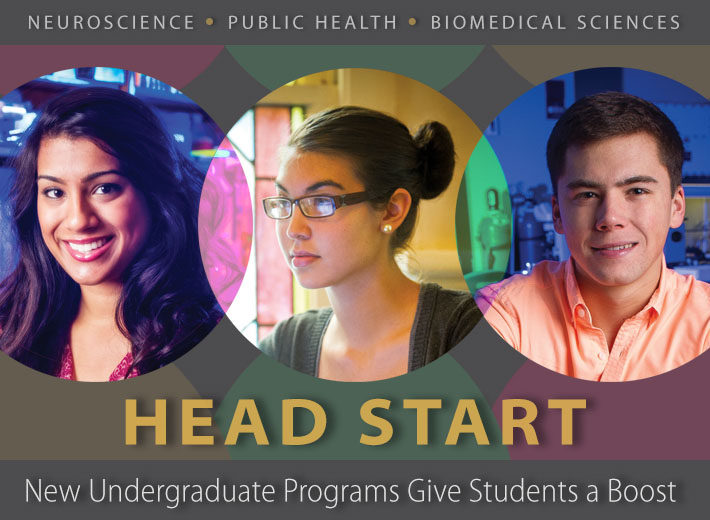
By Matt Windsor and Tara Hulen
As science and medicine become ever more specialized, and more important to the global economy, top programs are becoming increasingly competitive. “One of UAB’s strategic priorities is providing undergraduates with more of the close mentoring and hands-on research experiences they need to excel in 21st-century fields,” says UAB President Ray Watts, M.D. “As we do so, we are making our students all the more competitive in the job market and making our community, state, and nation more competitive in the technology-based knowledge economy.” Several UAB undergraduate programs are great examples, Watts says, exposing students to concepts once reserved only for graduate-level courses and allowing them to start doing real work in UAB’s research labs as early as their freshman year.
Neuroscience
The Undergraduate Neuroscience Program, launched in 2009, is an interdisciplinary program between the Department of Neurobiology—now a joint department in the School of Medicine and College of Arts and Sciences—and the Department of Psychology.
Students get the chance to interact with world-class researchers throughout their time in the major, says program co-director Carl McFarland, Ph.D., a professor in the psychology department. The opening course, for example, includes lectures from nearly a dozen UAB neuroscientists, and David Sweatt, Ph.D., chair of the neurobiology department, leads a senior seminar on mechanisms of memory.
Student demand has been “overwhelming,” McFarland says. “We are receiving applications from across the nation, and many are among the nation’s best students.” The average ACT for new students is 32, and the average GPA is 4.20, he adds.
More than 90 percent of UAB neuroscience graduates who have applied to graduate schools have been accepted, including senior Deepa Etikala (above left), who starts at the UAB School of Medicine this fall.
New programs in genetics and informatics now in development are being patterned after the success of the neuroscience program, Watts says.
Public Health
UAB’s undergraduate program in public health, introduced in fall 2013, allows students “to take on some of the most complex problems imaginable,” says Max Michael, M.D., dean of the School of Public Health. “They also will have a toolbox of resources to help solve them, and they will have a global perspective. These are three characteristics you won’t get with many other degrees.”
Sophomore Asia Sullivan (above center) was attracted to the new major “because it’s a very interdisciplinary field of study,” she says. “I see public health measures related to what I study put to use every day and am proud to be part of something so important to society.”
Students in the program learn to plan and manage health-care programs and study solutions to major health problems at local, national, and international levels. The major offers concentrations in environmental health sciences, global health studies, and public health preparedness.
Graduates can pursue positions with government agencies, nonprofit organizations, advocacy groups, hospitals and clinics, and research or education settings, says undergraduate program manager Nicole Gravitt. “We also anticipate a fair number of students going into professional schools and graduate programs,” including UAB’s master’s program in public health, says Gravitt.
Biomedical Sciences
The new bachelor of science degree in biomedical sciences in the School of Health Professions, which will debut in fall 2014, will focus on the study of life processes in the context of human health and disease risk, diagnosis, management, and treatment. The curriculum is clinically focused and is designed to prepare students for health-related graduate and professional programs, says Bradley Newcomer, Ph.D., inaugural director of the program. “The UAB campus has a deep-rooted history in health and medical education, so we are proud to offer a valuable addition to meet the tremendous increase in the number of students interested in health-care careers.”
The new major has attracted students such as Benjamin Burgess (above right), a sophomore and member of the Marine Corps who plans to be a military physician.
“We have intentionally designed the program to serve as a strong foundation for future professional or graduate study in health professions such as medicine, dentistry, optometry, physician assistant, clinical laboratory science, physical therapy, or biotechnology,” adds Newcomer. Students who want to enter the workforce immediately after graduation “will be ideally positioned for jobs in the pharmaceutical and biomedical device industry, as well as for jobs in medical, government, or industry research laboratories as a laboratory technician,” he notes.
Get Involved
• Get the details on UAB's undergraduate programs in neuroscience, public health, and biomedical sciences.
• Give something and change everything for students pursuing careers in these fields.